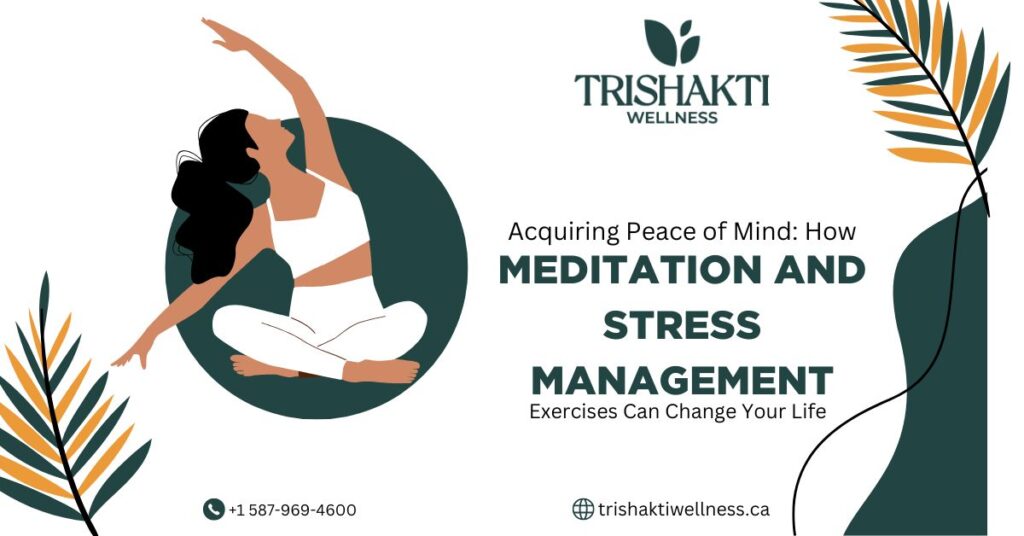Top Meditation Exercises to Alleviate Stress Effectively
Stress is widespread in the fast-paced world of today, but meditation can help. Using relaxing techniques, guided meditation lowers anxiety and fosters calmness. Exercises that promote mindfulness provide relief by concentrating on the here and now without passing judgment. Thoughts are anchored by techniques like body scans and focused breathing. Trishakti Wellness highlights that tension is rapidly reduced by deep breathing, which triggers relaxation responses. By offering a creative diversion, visualization promotes relaxation and stress Management.
The Long-term Benefits of Consistent Meditation Practice on Mental Health
Regular meditation has long-term advantages, but mental well-being can seem elusive in today’s hectic society. Because mindfulness rewires the brain and builds resilience, it lowers stress and enhances well-being. Regular meditation improves mental and physical health by assisting in the calm management of difficulties. Trishakti Wellness emphasizes that it promotes mental calm and a healthier future by reducing stress-related health problems. One of the most effective ways to achieve transformed mental well-being is to dedicate time to meditation.
How to Create a Daily Meditation Routine That Sticks
Establishing a regular meditation practice is easy and fruitful. Establish a daily time slot and concentrate on maintaining it. Focus on your breathing or use guided meditations for five minutes at first, then progressively extend as you feel more at ease. To make meditation automatic, include it into an already-existing habit. Being present every day is more important than being flawless. As it becomes a habit, you’ll soon notice a decrease in tension and an increase in mindfulness. Be patient and embrace this process.
The Long-Term Benefits of Regular Meditation on Mental Health and Well-Being
Meditation is crucial for mental wellness in today’s hectic society. Frequent practice improves focus, builds resilience, lowers cortisol levels, rewires the brain for clarity and tranquility, lowers anxiety and sadness, and boosts happiness. Accept this age-old practice to see how it might improve your wellbeing.
Conclusion:
In today’s fast-paced world, stress seems unavoidable, but meditation can change that. It offers benefits like mental clarity, emotional well-being, and inner peace. Regular meditation reduces stress and boosts mental health by helping you focus on the present. It’s accessible to everyone and fits any schedule—whether five minutes in the morning or before bed. Embrace meditation to conquer stress and enrich your life experience. Start small, stay consistent, and transform how you manage stress.
—FAQs:
How can regular meditation practice lead to a more peaceful mind?
In today’s fast-paced world, stress seems unavoidable, yet meditation can help. It offers benefits like cerebral clarity, emotional stability, and inner peace. Regular meditation reduces stress and enhances mental health by assisting you in concentrating on the present. It is available to everyone and can be used at any time, from five minutes in the morning to just before bed. Recognize that meditation can help you feel less stressed and live a better life. Start simple and be consistent to change the way you deal with stress.
In what ways does meditation improve stress management skills?
Stress seems inevitable in the fast-paced world of today, but meditation can help. It provides advantages including inner calm, emotional stability, and mental clarity. Frequent meditation helps you focus on the here and now, which lowers stress and improves mental wellness. Everyone has access to it, and they can use it whenever they want, from five minutes in the morning to right before bed. Realize that meditation can improve your quality of life and reduce stress. To alter the way you handle stress, start small and be persistent.
Why should you consider incorporating stress management exercises into your daily routine?
Stress is widespread in the fast-paced world of today. By lowering anxiety and increasing productivity, incorporating yoga, meditation, and deep breathing can promote well-being. They also enhance mood, immunity, and sleep quality by reducing cortisol levels. These exercises help people become more resilient so they can deal calmly with life’s uncertainties. Making them a daily priority is an investment in future health. Begin now to overcome obstacles with courage and composure.
What evidence supports the transformative effects of meditation on mental health?
Based on scientific data, meditation is a valuable tool for improving mental health. It enhances well being and lessens the signs of despair and anxiety. According to research, mindfulness meditation can help with these problems; Harvard studies found that after just eight weeks, there were changes in the brain. By triggering the parasympathetic nervous system to reduce cortisol levels, meditation helps people manage stress. These results demonstrate the advantages of meditation for everyday cognitive performance and emotional health.

